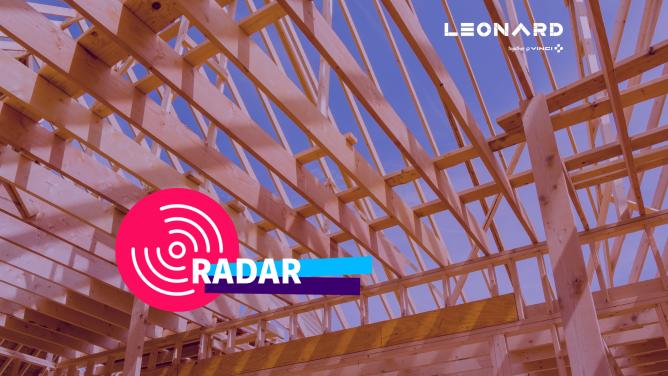Inergeen will partner with the French Tennis Federation to equip Roland Garros’ village with their Cubeen structures.
The French Tennis Federation has chosen the Cubeen removable structures to build the village outside Roland Garros stadium in 2020. 18 Cubeen will be installed for the tournament. During the last edition, 9 Cubeen were already used on the adjoining courts.
Cubeen allows event professionals and companies to easily assemble/disassemble ecological and energy-efficient outdoor spaces. Behind these installations is the start-up Inergeen which joined SEED in 2019, Leonard’s acceleration program dedicated to innovative projects for the construction industry. Inergeen designs, manufactures and sells solutions for creating high-tech and eco-responsible outdoor spaces. Their solutions are modular and autonomous in energy, the installations can produce electricity with photovoltaic or micro-wind technology.
The modular construction market is booming. It could reach $107 billion in 2026, with an annual growth rate of 6%. For builders, modular construction is a huge time saver: projects are 30 to 50% faster to build than traditional ones.
OnSiteIQ raises $4.5 million to improve construction safety using AI and 360-degree imagery
OnSiteIQ announced recently it has raised $4.5 million in a serie A round to further develop its 360-degree imagery technology that aims to make construction sites safer.
The technology relies on a network of high-resolution cameras that captures multiple videos. The AI gathers the data and generates a risk assessment report. On top of that, it gives construction site managers a Google Street View-like tool to track progress in real time.
Overall, it would help to facilitate the inspections and risk assessments on job sites to reduce the number of fatalities. More than 21% of all work-related deaths happened in the construction industry in the USA in 2018.
The market is hot : Indus.ai raised $8 million with its computer vision technology dedicated to safety last fall and Autodesk (an American software editor) launched Construction IQ one year ago, a tool dedicated to monitor safety compliance on job sites.
Brick&Bolt, a platform that wants to simplify construction business in India, is raising $1.5 million from Sequoia’s accelerator program
Brick&Bolt is an Indian construction marketplace that uses AI to connect users and contractors.
The pre-series A round was led by Sequoia’s accelerator, Surge, a scale-up program for startups in India and Southeast Asia.
Finding the right professionals in construction and getting the right prices can be really time-consuming for individual customers.
Brick&Bolt wants to make it seamless by connecting customers to curated service providers, with transparent pricing and legal protection. The AI based engine is predicting the work schedules, managing quality and progress of projects using computer vision.
The company currently has over 260 independent constructors on board in the area of Bangalore. The fundraising will help to scale the project to all India.
The Indian construction industry should reach $640 billion in 2022, aided by government initiatives in infrastructure development and affordable housing. Other Indian construction startups like Tracecost (cost tracking software) and 100pillars (housing constructor) are thriving and claim to be already profitable.
The British government is investing £21 million to develop local and smart energy infrastructures
The UK government will invest in 10 smart energy projects across the UK that will form a blueprint for greener localised energy generation and help to meet the government’s 2050 net-zero emission target.
Among these projects are :
- Zero Carbon Rugeley: building a zero carbon town using locally-produced energy in Rugeley, a post-industrial town in the center of UK.
- REWIRE-NW: Using 5G and data-centric intelligence to optimise the energy infrastructure in Warrington and deliver average cost savings of 25%.
- Milford Haven Energy Kingdom : supporting shift from natural gas to hydrogen using hydrogen-ready heat pumps and hydrogen fuel cell vehicles.
Overall, the 10 projects could see over 250,000 people’s homes powered by local renewable sources by 2030 – which could lead to their energy bills reducing by as much as half.
Overall, £70 million will be dedicated to develop hydrogen technology, including funding for Europe’s first hydrogen plants, which could generate enough clean energy to heat over 200,000 homes.



